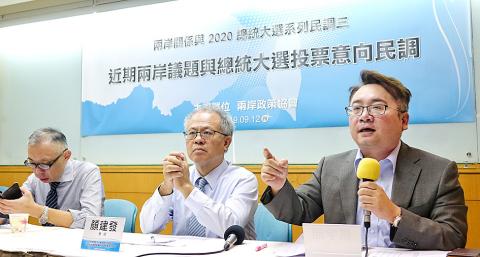President Tsai Ing-wen (蔡英文) is leading the presidential race in three hypothetical scenarios, according to a poll released yesterday by the Cross-Strait Policy Association.
Up against just Chinese Nationalist Party’s (KMT) presidential nominee, Kaohsiung Mayor Han Kuo-yu (韓國瑜), Tsai would win the election by 16.4 percent, with the two candidates claiming 50.1 percent and 33.7 percent of the vote, the poll showed.
If Hon Hai Precision Industry Co (鴻海精密) founder Terry Gou (郭台銘) joins the race, Tsai, Han and Gou would receive 38.7 percent, 26.7 percent and 23.2 percent of the vote respectively, it showed.

Photo: Liu Hsin-de, Taipei Times
Tsai would lead with 33.2 percent of the vote in a hypothetical four-way race against Han, Gou and Taipei Mayor Ko Wen-je (柯文哲), who would win 24.3 percent, 18.1 percent and 13.9 percent respectively, it added.
The poll, which was commissioned by the association and carried out by Evidence-Based Survey and Research Co (循證民調), surveyed 1,087 adults on Monday and Tuesday, with a 95 percent confidence level and a sampling error of 2.97 percent.
Respondents were also asked for their views on the four politicians’ diplomatic abilities, as well as a number of government policies.
Most (35.7 percent) believed that Tsai is the most capable of handling Taiwan-US relations, followed by Gou (18.1 percent), Han (15.0 percent) and Ko (3.7 percent), the poll showed.
Tsai would also be the best at handling Taiwan-Japan relations, 36.8 percent said, compared with Gou’s and Han’s 13.8 percent and Ko’s 6.0 percent, it showed.
Asked which of the four would be the most capable of facing down Beijing’s threat and handling cross-strait relations, 32.2 percent said Tsai, 24.1 percent said Han, 15.8 percent said Gou and 4.7 percent said Ko, it added.
Meanwhile, 42.1 percent of respondents agreed with the Mainland Affairs Council’s plan to restrict “political propaganda that endangers national security” in a proposed bill to address “agents of the Chinese Communist Party,” while 25.6 percent disagreed, the poll showed.
Fifty-five percent supported deepening military ties with the US, while 25 percent opposed when given the example of US President Donald Trump approving the sale of 66 F-16V jets to Taiwan last month, it showed.

MAKING WAVES: China’s maritime militia could become a nontraditional threat in war, clogging up shipping lanes to prevent US or Japanese intervention, a report said About 1,900 Chinese ships flying flags of convenience and fishing vessels that participated in China’s military exercises around Taiwan last month and in January last year have been listed for monitoring, Coast Guard Administration (CGA) Deputy Director-General Hsieh Ching-chin (謝慶欽) said yesterday. Following amendments to the Commercial Port Act (商港法) and the Law of Ships (船舶法) last month, the CGA can designate possible berthing areas or deny ports of call for vessels suspected of loitering around areas where undersea cables can be accessed, Oceans Affairs Council Minister Kuan Bi-ling (管碧玲) said. The list of suspected ships, originally 300, had risen to about

DAREDEVIL: Honnold said it had always been a dream of his to climb Taipei 101, while a Netflix producer said the skyscraper was ‘a real icon of this country’ US climber Alex Honnold yesterday took on Taiwan’s tallest building, becoming the first person to scale Taipei 101 without a rope, harness or safety net. Hundreds of spectators gathered at the base of the 101-story skyscraper to watch Honnold, 40, embark on his daredevil feat, which was also broadcast live on Netflix. Dressed in a red T-shirt and yellow custom-made climbing shoes, Honnold swiftly moved up the southeast face of the glass and steel building. At one point, he stepped onto a platform midway up to wave down at fans and onlookers who were taking photos. People watching from inside

Japan’s strategic alliance with the US would collapse if Tokyo were to turn away from a conflict in Taiwan, Japanese Prime Minister Sanae Takaichi said yesterday, but distanced herself from previous comments that suggested a possible military response in such an event. Takaichi expressed her latest views on a nationally broadcast TV program late on Monday, where an opposition party leader criticized her for igniting tensions with China with the earlier remarks. Ties between Japan and China have sunk to the worst level in years after Takaichi said in November that a hypothetical Chinese attack on Taiwan could bring about a Japanese

The WHO ignored early COVID-19 warnings from Taiwan, US Deputy Secretary of Health and Human Services Jim O’Neill said on Friday, as part of justification for Washington withdrawing from the global health body. US Secretary of State Marco Rubio on Thursday said that the US was pulling out of the UN agency, as it failed to fulfill its responsibilities during the COVID-19 pandemic. The WHO “ignored early COVID warnings from Taiwan in 2019 by pretending Taiwan did not exist, O’Neill wrote on X on Friday, Taiwan time. “It ignored rigorous science and promoted lockdowns.” The US will “continue international coordination on infectious